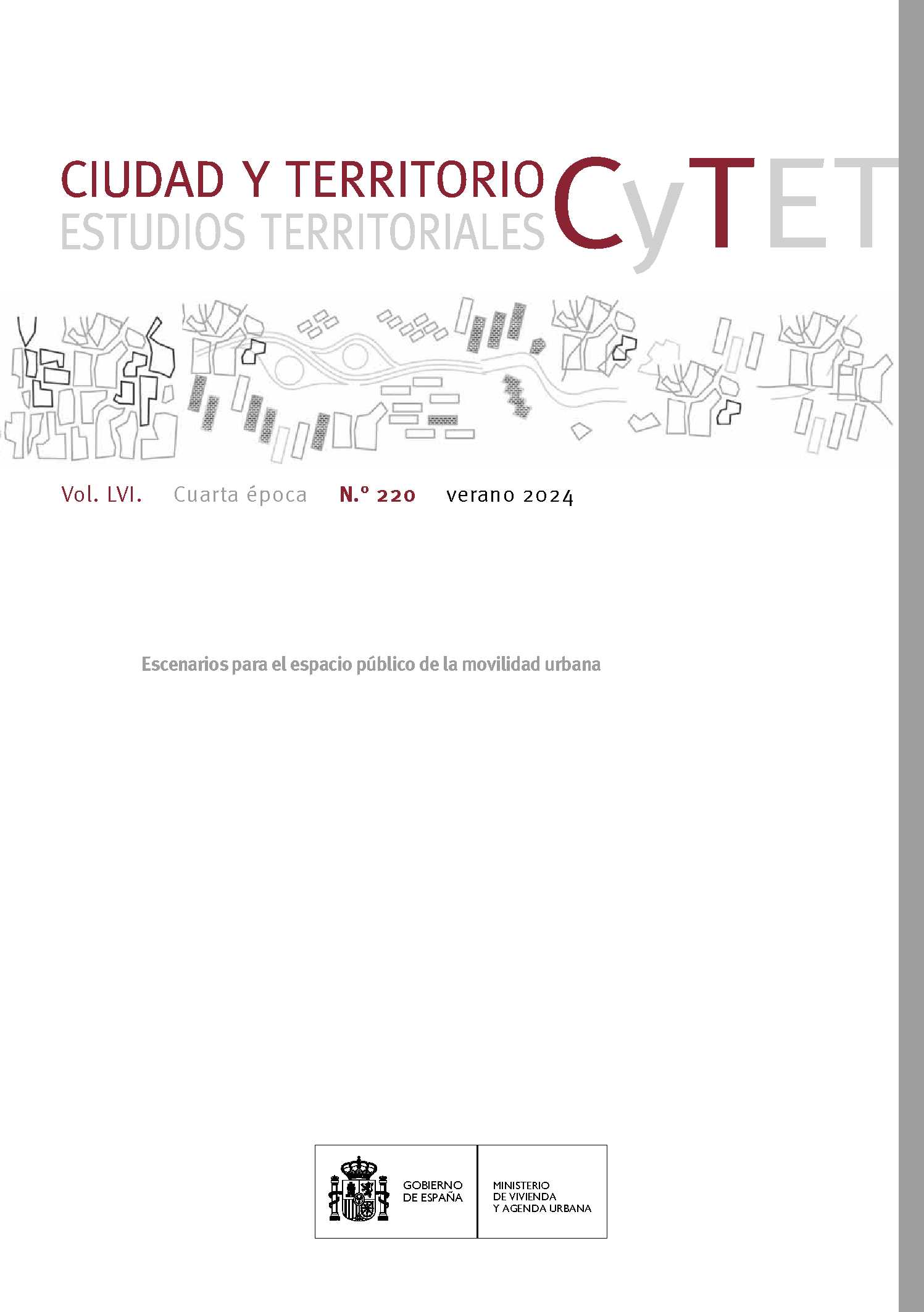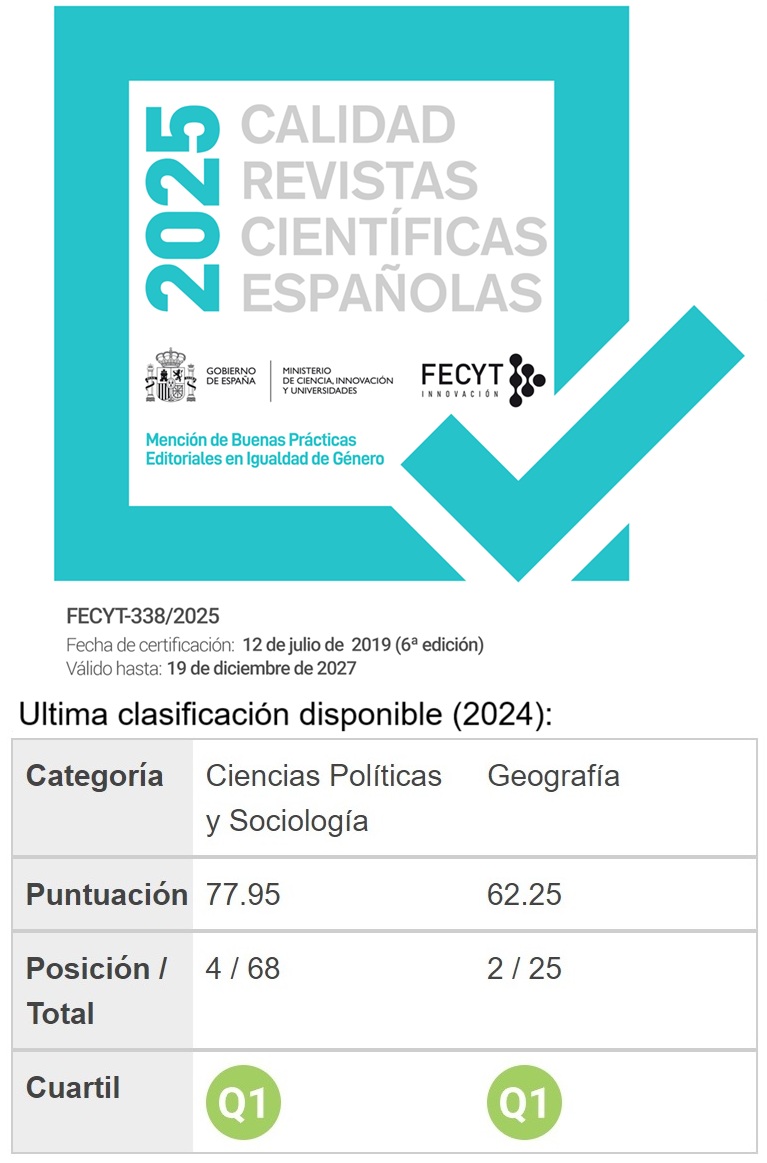Repensando el concepto de “Calles Completas” desde miradas decoloniales
DOI:
https://doi.org/10.37230/CyTET.2024.220.10Palabras clave:
Calles completas y automovilidad, Estrategias de cambio, Perspectiva decolonial, Cuidados, Investigación-acciónResumen
La aplicación de políticas de "Calles Completas", originada en Estados Unidos en la segunda mitad del siglo XX, se ha generalizado en todo el mundo, extendiéndose incluso a las principales ciudades del Sur Global. Sin embargo, los retos que plantea la realidad del Norte Global difieren fuertemente de los presentes en los países en desarrollo. Este artículo se centra en el contexto latinoamericano, reflexionando sobre las lagunas que ha dejado su carácter colonizador y su implementación en la Región. Desde una perspectiva decolonial, estos vacíos se exploran a través de un estudio cualitativo que examina la visión de las calles desde la perspectiva de diferentes actores en dos comunas de Santiago de Chile. Se concluye que el conocimiento adquirido a partir de las experiencias y perspectivas de las comunidades locales es fundamental para planificar y diseñar Calles Completas para el Buen Vivir.
Descargas
Citas
ACOSTA, A. (2009): El Buen Vivir, una utopía por (re)construir. Revista Casa de las Américas, 257, 33-46. http://www.casadelasamericas.org/publicaciones/revistacasa/257/hechosideas.pdf
ALTMANN, P. (2014): "Good Life As a Social Movement Proposal for Natural Resource Use: The Indigenous Movement in Ecuador." Consilience, Columbia University 12: 82-94.
ALTMANN, P. (2020): The Good Life. Development and Cooperation D&C. Bonn, Germany, Service für Entwicklungsinitiativen.
BECKMANN, J. (2001): Automobility a social problem and theoretical concept. Environment and Planning D: Society and Space 19: 593-607. https://doi.org/10.1068/d222t
BORSDORF, A. (2014): Hacia la ciudad fragmentada: tempranas estructuras segregradas en la ciudad latinoamericana. Scripta Nova: Revista electrónica de geografía y ciencias sociales, ISSN 1138-9788, Nº. 7, 146. https://www.researchgate.net/publication/28063766_
BUEHLER, R. & PUCHER, J. (2021): Cycling for Sustainable Cities. MIT Press: Cambridge MA, US.
BURDEN, D. & LITMAN, T. (2011): America Needs Complete Streets. ITE Journal 81(4), 36-43. https://www.smartgrowthamerica.org/app/legacy/documents/cs/resources/cs-ite-apr11.pdf
CALDEIRA, T. P. (2017): Peripheral urbanization: Autoconstruction, transversal logics, and politics in cities of the global south. Environment and Planning D: Society and Space, 35(1), 3–20. https://doi.org/10.1177/0263775816658479
CALLOWAY, D. M. & FAGHRI, A. (2020): Complete Streets and Implementation in Small Towns. Current Urban Studies, 8, 484-508. https://doi.org/10.4236/cus.2020.83027
CANTARIM, F. & ULTRAMARI, C. (2021): Planning Practice in Latin America: The Legacy of the Traveling Urbanists and Other Vertical Dialogues. Journal of Urban History. https://doi.org/10.1177/00961442211018663
CASSIÁN-YDE, N. (2019): Descolonizar las epistemologías urbanas: Saber experto y colectivos por el derecho a la ciudad, ¿quién puede decir "la verdad sobre los problemas de la ciudad? Journal of Latin American Geography 18(3): 54-84.https://doi.org/10.1353/lag.2019.0056
CEDEUS. (2018): Calles Completas experiencia internacional y aplicabilidad en Chile. Briefing Paper.
CICCOLELLA, P. & MIGNAQUI, I. (2021): Metamorfosis y reescalamiento territorial: megarregión y expansión urbana en el sudeste bonaerense (2000-2020): Rev Punto Sur (4), 47-71. https://doi.org/10.34096/ps.n4.10402
DEKKER, H.-J. (2020): Cycling Pathways The Politics and Governance of Dutch Cycling Infrastructure, 1920-2020. Amsterdam University Press.
ECOLA, L. & ROHR, CH. & ZMUD, J. & KUHNIMHOF, T. & PHLEPS, P. (2014): The Future of Driving in Developing Countries. Washington, DC, US, Rand Corporation: 138. https://doi.org/10.7249/RB9794
EDWARDS, F. & POPARTAN, L. A. & PETTERSEN, I. N. (Eds.). (2023): Urban Natures: Living the more-than-human city (Vol. 1). Berghahn Books.
ESCOBAR, A. & CHAPARRO, M. (2020): Divergencias, alternativas y transiciones de los modelos y las comunicaciones para el buen vivir. Chasqui (13901079), (144).
FATHEUER, T. (2011): Buen Vivir A brief introduction to Latin America’s new concepts for the good life and the rights of nature. Publication Series On Ecology. H. B. Foundation. Berlin, Germany, Heinrich Böll Foundation.
GASTIL, J. (2000): Is Face-to-Face Citizen Deliberation a Luxury or a Necessity? Political Communication 17: 357-361. https://doi.org/10.1080/10584600050178960
GIL, J. (2017): Urban Modality - Integrated approaches for sustainable urban mobility. [Comunicación en congreso]. Transition to future travel and transport at Chalmers Area of Advance Transport, Gotemburgo. DOI:https://doi.org/10.13140/RG.2.2.35682.79042
GRIM, J., (Ed). (2001): Indigenous Introduction Religions of the World and Ecology Series. Yale Forum on Religion and Ecology. US, Yale University.
GROSS, L. W. (2002): "Bimaadiziwin, or the “Good Life,” as a Unifying Concept of Anishinaabe Religion." American Indian Culture and Research Journal 26(1): 15-32.
GUDYNAS, E. (2014): El buen vivir repolitiza los debates sobre el desarrollo. Revista Kavilando, 6(2).
GUERRERO, P. (2002): La Cultura, estrategias conceptuales para entender la identidad, la diversidad, la alteridad y la diferencia. Quito: Abya-Yala, 134 p.
HENDERSON, J. (2006): Secessionist Automobility: Racism, Anti-Urbanism, and the Politics of Automobility in Atlanta, Georgia. International Journal of Urban and Regional Research, 30(2), 293-307.
JIRÓN, P. & MANSILLA, P. (2014): Atravesando la espesura de la ciudad: vida cotidiana y barreras de accesibilidad de los habitantes de la periferia urbana de Santiago de Chile. Rev. Geografía Norte Grande 56. http://dx.doi.org/10.4067/S0718-34022013000300004
KASH, G. & HIDALGO, D. (2011): User perception of Bogotá's integrated public transport system trends and implications for program implementation. Transportation Research Board Annual Meeting. http://www.brt.cl/user-perception-of-bogota’s-integrated-public-transport-system-trends-and-implications-for-program-implementation/
KINGSBURY, K. & LOWRY, M. & DIXON, M. (2011): What makes a “complete street” complete? A robust definition, given context and public input. Transportation Research Record, 2245(1), 103-110. https://doi.org/10.3141/2245-13
KUNSTLER, J. H. (1993): The Geography of Nowhere: The Rise and Decline of America's Man-made Landscape. New York, Simon & Schuster.
LONDOÑO, M. & RESTREPO, A. & ZULUAGA, L. (2017): Calles para todos. Repensando las calles. Módulo Arquitectura-CUC, 18(1), 91-108. https://revistascientificas.cuc.edu.co/moduloarquitecturacuc/article/view/1953
MACEDO, J. (2013): Planning a Sustainable City: The Making of Curitiba, Brazil. Journal of Planning History 12(4): 334-353. https://doi.org/10.1177/1538513213482093
MCFARLANE, C. (2018): Fragment urbanism: Politics at the margins of the city. Environment and Planning D: Society and Space, 36(6), 1007–1025. https://doi.org/10.1177/0263775818777496
MENESES, P.M. (2016): Ampliando las epistemologías del sur a partir de los sabores: diálogos desde los saberes de las mujeres de Mozambique. Revista Andaluza de Antropología, 10, 10-28. https://doi.org/10.12795/RAA.2016.10.02
MOHL, R. (2002): The Interstates and the Cities: Highways, Housing, and the Freeway Revolt. http://www.prrac.org/pdf/mohl.pdf
MOULAERT, F. & SWYNGEDOUW, E. & MARTINELLI, F. & GONZALEZ, S. (2010): Can neighborhoods save the city? Community development and social innovation. New York, Routledge. https://doi.org/10.4324/9780203849132
Organización de las Naciones Unidas, ONU (2016): Objetivos del Desarrollo Sostenible. Habitat III. Naciones Unidas. https://www.un.org/sustainabledevelopment/es/sustainable-development-goals/
PÁRAMO, P. (compil.) (2018): La investigación en ciencias sociales, técnicas de recolección de información. Bogotá: Universidad Piloto de Colombia. 272 p.
PATTON, M. (2002): Purposeful sampling. In Qualitative Research and Evaluation Methods. (pp. 230-246). Sage Publications.
PELLUCHON, C. (2018): La réparation du monde: Repères philosophiques pour une société post-carbone. Esprit, (12), 132-142.
PUIG DE LA BELLACASA, M. (2017): Matters of care: Speculative ethics in more than human worlds (Vol. 41). U of Minnesota Press.
ROZAS-KRAUSE, V. (2022): ¿Decolonizar la arquitectura?. ARQ (Santiago), (110), 14-15. http://dx.doi.org/10.4067/S0717-69962022000100014
SAGARIS, L. (2015): Lessons from 40 years of planning for cycle-inclusion: Reflections from Santiago, Chile. Natural Resources Forum 39(1): 64-81. https://doi.org/10.1111/1477-8947.12062
SAGARIS, L. & TIZNADO-AITKEN, I. (2017): Exploring the social and spatial potential of an intermodal approach to transport planning. International Journal of Sustainable Transportation 11(10): 721-736. https://doi.org/10.1080/15568318.2017.1312645
SAGARIS, L. & TIZNADO-AITKEN, I. & BERRÍOS, E. (2020): Using PAR to frame research and action on transport justice, A pilot experience in two contrasting Chilean cities. Journal of Transport Geography 83. https://doi.org/10.1016/j.jtrangeo.2020.102654
SALAZAR, G. (2003): Ferias Libres, espacio residual de soberanía popular. ediciones SUR, Santiago, Chile.
SCHWARZ, A. & STREULE, M. (2016): A transposition of territory: Decolonized perspectives in current urban research. International Journal of Urban and Regional Research, 40(5), 1000-1016. https://doi.org/10.1111/1468-2427.12439
SHELLER, M. & URRY, J. (2000): The City and The Car. International Journal of Urban and Regional Research 24(4). https://doi.org/10.1111/1468-2427.00276
SINTOS COLOMA, R. (2020): Decolonizing Urban Education, Educational Studies, 56:1, 1-17. https://doi.org/10.1080/00131946.2019.1711095
SMART GROWTH AMERICA (2017): What are Complete Streets? [25 de junio de 2022] https://smartgrowthamerica.org/what-are-complete-streets/
THOMSON K. (2001): From Neighborhood to Nation, the Democratic Foundations of Civil Society. Hanover and London, University Press of New England.
TEMES-CORDOVEZ, R. R. & BUENO-CARVAJAL, J. M. (2023): Transformaciones en el espacio público frente a la crisis de la COVID – 19: aportaciones de algunas experiencias emergentes en Latinoamérica. Ciudad y Territorio Estudios Territoriales, 55(218), 1055–1070. https://doi.org/10.37230/CyTET.2023.218.4
TIRONI, M. (2023): Introduction: Design for more-than-human futures: Towards post-anthropocentric and decolonial perspectives. In Design For More-Than-Human Futures (pp. 1-28). Routledge.
TIRONI, M. & VIVANCO, T. & MOLLENHAUER, K (2023): Hacia un diseño distribuido en escenarios de crisis. Fricciones y futuros de los colectivos de la fabricación digital en Chile. Revista 180, (52). http://dx.doi.org/10.32995/rev180.Num-52.(2023).art-1098
TORRES-SOLIS, M. & RAMÍREZ-VALVERDE, B. (2019): Buen Vivir y vivir bien: alternativas al desarrollo en Latinoamérica. Latinoamérica [online]. 2019, n.69, pp.71-97. ISSN 2448-6914. https://doi.org/10.22201/cialc.24486914e.2019.69.57106.
VEGA SOLÍS, C. (2019): Reproducción social y cuidados en la reinvención de lo común. Aportes conceptuales y analíticos desde los feminismos. Revista de Estudios Sociales, (70), 49-63.
WOOD, D. (2017): Descolonizar el conocimiento: una mise en place epistemográfica. Tabula Rasa, 27, 301-337. https://doi.org/10.25058/20112742.453
ZAVESTOSKI, S. & J. AGYEMAN (2015): Incomplete Streets, Processes, Practices, and Possibilities. London, UK, Routledge. https://doi.org/10.4324/9781315856537
Publicado
Cómo citar
Número
Sección
Licencia
Derechos de autor 2024 Martin Tironi, Lake Sagaris, Marcela Moraga-Zárate, Rosana Forray

Esta obra está bajo una licencia internacional Creative Commons Atribución-NoComercial-SinDerivadas 4.0.
Sin perjuicio de lo dispuesto en la legislación vigente sobre Propiedad Intelectual, y conforme a la misma, el/la los/las autor/a/es/as que publiquen en CyTET cede/n a título gratuito, de modo no exclusivo y sin límite temporal al Ministerio de Transportes, Movilidad y Agenda Urbana los derechos para difundir, reproducir, comunicar y distribuir en cualquier formato actual o futuro, en papel o electrónico, la versión original o derivada de su obra bajo licencia de Creative Commons Reconocimiento-NoComercial-SinObraDerivada 4.0 Internacional (CC BY-NC-ND 4.0), así como para incluir o ceder a terceros la inclusión de su contenido en índices, repositorios y bases de datos nacionales e internacionales, con referencia y reconocimiento en todo caso de la autoría del mismo.
Además, al realizar el envío, el/la los/las autor/a/es/as declara/n que se trata de un trabajo original en el que se reconocen las fuentes que han sido utilizadas en su estudio, comprometiéndose a respetar la evidencia científica y a no modificar los datos originales para verificar o refutar una hipótesis de partida; que el contenido esencial del mismo no ha sido publicado previamente ni se publicará en ninguna otra obra o revista mientras esté en proceso de evaluación en la revista CyTET; y que no se ha remitido simultáneamente a otra publicación.
Los autores deben firmar un Formulario de Cesión de Derechos, que les será enviado desde la Secretaría de CyTET una vez se acepte su artículo para ser publicado.
Con el objetivo de favorecer la difusión del conocimiento, CyTET se adhiere al movimiento de revistas de Open Access (OA) y entrega la totalidad de sus contenidos a diversos índices, repositorios y bases de datos nacionales e internacionales bajo este protocolo; por tanto, la remisión de un trabajo para ser publicado en la revista presupone la aceptación explícita por parte del autor/a de este método de distribución.
Se anima a las/os autoras/es a reproducir y alojar sus trabajos publicados en CyTET en repositorios institucionales, páginas web, etc. con la intención de contribuir a la mejora de la transferencia del conocimiento y de la citación de dichos trabajos.








 Enlace a CyTET en Linkedin
Enlace a CyTET en Linkedin